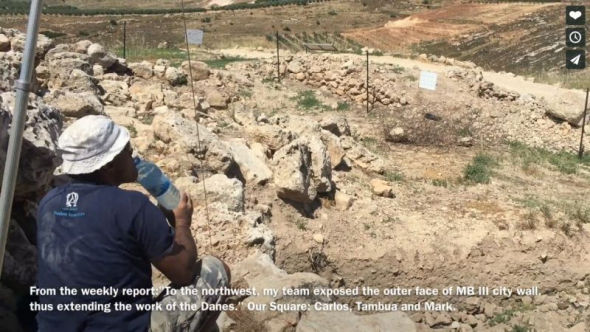Archaeologists find clues in search for the Ark of the Covenant

Archaeologists searching for the Ark of the Covenant at Shiloh in the West Bank say they have discovered ancient clues that suggest they're getting closer to determining whether the site really held the stone tablets bearing the 10 Commandments.
The Times of Israel reported on Monday that researchers at the dig in Shiloh are trying to find evidence that the Bible is also a history textbook and holds revelations about humanity's past.
Shiloh is mentioned in the Bible as the site where the the Ark and the Tabernacle, believed to be the earthly dwelling place of God, were venerated for close to 369 years.
The article noted that the latest excavations at the site, which have been going on for decades, are "already encouraging," but not "remotely definitive," pointing to the discovery of 10 pre-First Temple pottery jugs.
"Because of their intrinsic value, scholars say, these vessels could indicate the site was vacated in an abrupt manner, as described in the Bible. Additionally, the archaeologists found a kobaat, a goblet or ritual chalice, which could be linked to religious use," the article described.
Still, excavations are yet to find definitive evidence that the biblical artifacts were indeed held at Shiloh.
Scott Stripling of the Associates for Biblical Research noted that unlike many other modern Israeli archaeologists, his team has a strong religious faith that sets them apart.
Stripling said: "There are some who say the Bible is unreliable. We have found it to be very reliable."
"We're taking the Bible as a serious historical document," he said, adding "but the evidence is what the evidence is."
The Bible states in the Psalms and in the book of Jeremiah that Shiloh was destroyed when the Israelites were defeated by the Philistines, who also stole the Ark of the Covenant.
Hanina Hizami, coordination officer for archaeology at the Civil Administration, explained that the discovery of the 10 pottery jars could provide evidence for the destruction of Shiloh.
"This is a very exciting find. The destruction could have been caused by the Philistine invasion and the fire that raged [at Shiloh]," Hizami said.
Speaking about the dig at Shiloh, Stripping told donors: "A sense of awe came upon me as I contemplated how God had set before us an open door at Shiloh which will have a direct impact on how people read their Bibles in the future.
"I saw the stakes that I drove into the ground back in May and envisioned the 100 volunteers and staff who will work with us in Season One. I thought of the first words ever sent via Morse code — 'Behold what wonders God has wrought!'" he added.
Archaeologists from France and Israel have separately also been searching for the Ark at the ancient site of Kiryat Ye'arim outside Jerusalem, said to be one of the last remaining unexplored locations in the region.
"The place is important for several reasons," said at the time Professor Israel Finkelstein, from Tel Aviv University. "It's a large, central site in the Jerusalem hills that hasn't been studied until now."
"It may be the only key site in Judah that hasn't undergone a systematic archaeological excavation."











